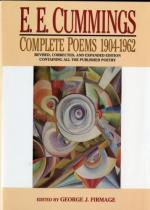|
This section contains 4,436 words (approx. 15 pages at 300 words per page) |

|
SOURCE: Docherty, Brian. “e. e. cummings.” In American Poetry: The Modernist Ideal, edited by Clive Bloom and Brian Docherty, pp. 120-30. Houndmills and London: Macmillan, 1995.
In the following essay, Docherty discusses the paradox of modernism and traditionalism in Cummings’s poetry.
e. e. cummings is at once the most modern of traditionalists and the most traditional of Modernists. This ironic paradox runs through both his life and his poetry. Born in 1894 to a family of impeccably New England Puritan stock, his life as a writer was to some extent a negation of his background. Like Ezra Pound, cummings never held a ‘normal’ job, but lived true to his principles, devoted to his art even at the expense of so-called material success. His father was both an academic, who became America's first Professor of Sociology, and a Unitarian minister at Boston's fashionable Back Bay Church. Two conspicuous features of...
|
This section contains 4,436 words (approx. 15 pages at 300 words per page) |

|


